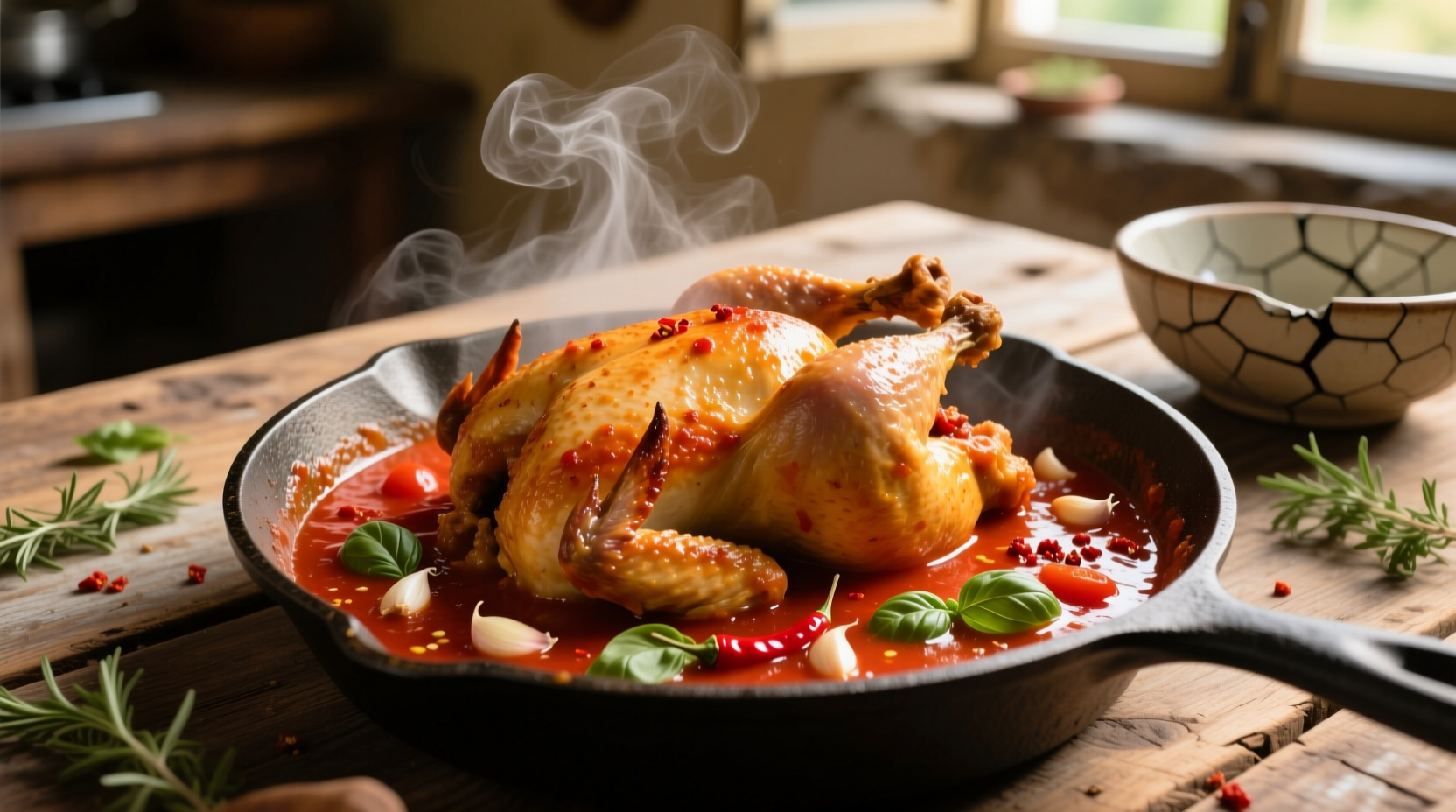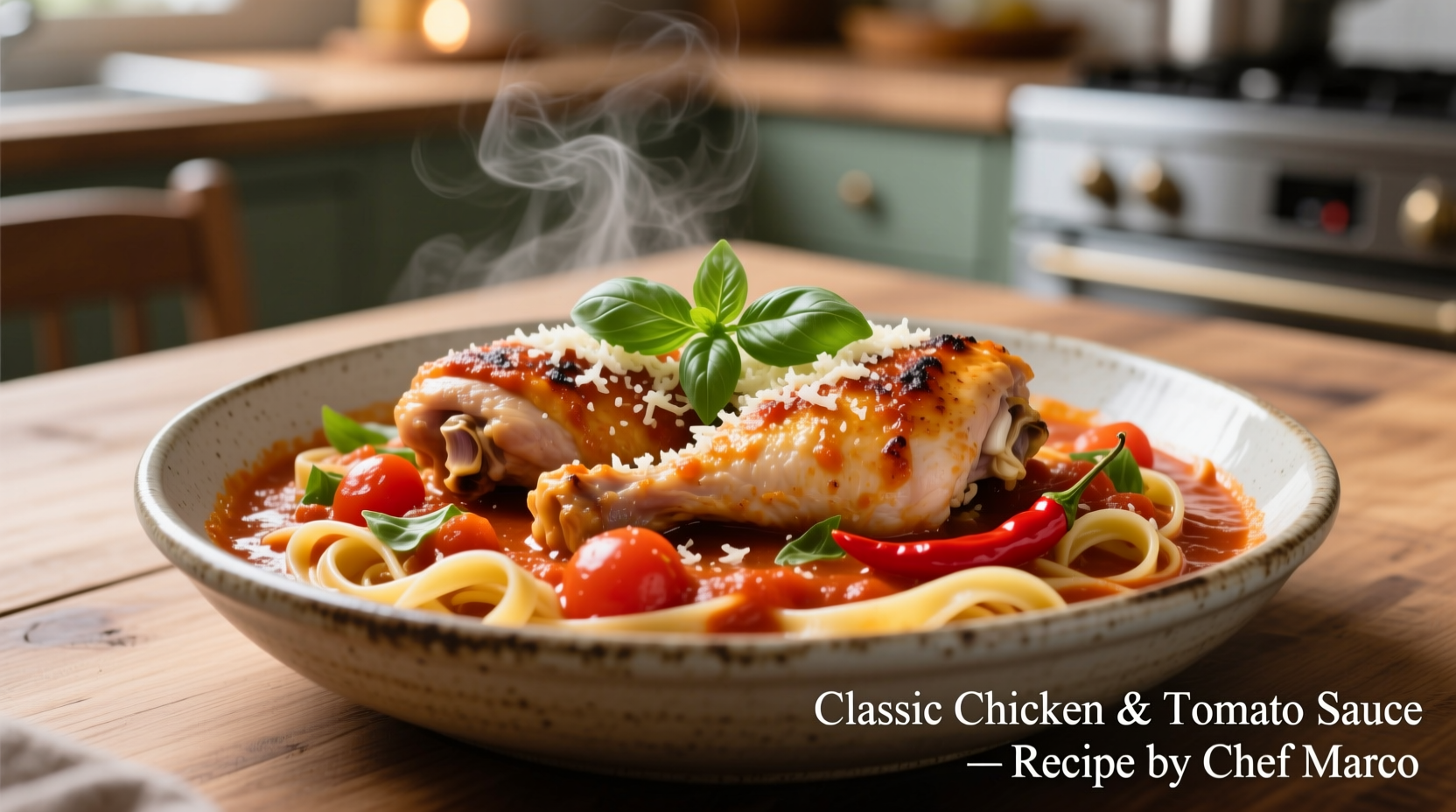Craving a comforting meal that's both simple to prepare and packed with flavor? This chicken tomato sauce recipe delivers perfectly cooked poultry in a vibrant, herb-infused tomato base that works for weeknight dinners or special occasions. Whether you're a beginner cook or looking to refine your technique, our step-by-step guide ensures juicy chicken and a balanced sauce every time.
Why This Chicken Tomato Sauce Recipe Works
Unlike many online recipes that either dry out the chicken or produce a bland sauce, our method incorporates professional techniques for maximum flavor development. The secret lies in properly searing the chicken to create fond (those delicious browned bits), then deglazing the pan to incorporate those flavors into the sauce. This approach follows the culinary principle of fond utilization that professional chefs use to build complex flavors.
| Prep Time | Cook Time | Total Time | Servings |
|---|---|---|---|
| 15 minutes | 30 minutes | 45 minutes | 4 |
Essential Ingredients for Flavorful Chicken Tomato Sauce
Quality ingredients make the difference between ordinary and extraordinary. While you can substitute some elements, these core components create the foundation for authentic flavor:
- Chicken: 4 boneless, skinless chicken breasts (about 1.5 lbs) - USDA food safety guidelines recommend cooking poultry to an internal temperature of 165°F (73.8°C) to eliminate harmful bacteria
- Tomatoes: 28 oz can of whole peeled San Marzano tomatoes (D.O.P. certified for authentic Italian flavor)
- Aromatics: 1 large yellow onion (finely diced), 4 garlic cloves (minced)
- Herbs: 2 tbsp fresh basil (chopped), 1 tsp dried oregano
- Liquid: ½ cup chicken broth (low sodium)
- Fat: 2 tbsp extra virgin olive oil
- Seasoning: Salt and freshly ground black pepper to taste

Step-by-Step Cooking Instructions
Preparation Phase
Before heating your pan, prepare all ingredients (mise en place). Pat chicken dry with paper towels—this critical step ensures proper browning rather than steaming. Season both sides generously with salt and pepper. Dice the onion and mince the garlic, keeping them separate as they'll go into the pan at different times.
Searing the Chicken
Heat olive oil in a large skillet over medium-high heat until shimmering but not smoking. Add chicken in a single layer without crowding the pan (work in batches if needed). Sear for 5-6 minutes per side until golden brown. Don't move the chicken while searing—this creates the flavorful fond essential for the sauce. Transfer to a plate.
Building the Sauce Foundation
In the same skillet with the flavorful browned bits, add onions and cook for 4-5 minutes until translucent. Add garlic and cook for 1 minute until fragrant but not browned. Pour in ¼ cup chicken broth to deglaze the pan, scraping up all the browned bits from the bottom.
Simmering to Perfection
Add tomatoes (crushing them by hand as you add them), remaining broth, oregano, and half the basil. Bring to a gentle simmer, then return chicken to the skillet, nestling it into the sauce. Reduce heat to low, cover, and cook for 15-20 minutes until chicken reaches 165°F internally.
Pro Tips for Best Results
Professional chefs use these techniques to elevate simple dishes:
- Acid balance: If your sauce tastes too acidic, add a pinch of sugar or a small grated carrot during cooking—the natural sugars counteract acidity without making the sauce sweet
- Texture control: For a smoother sauce, use an immersion blender for 10-15 seconds after cooking
- Flavor development: Let the finished dish rest for 10 minutes before serving—this allows flavors to meld and chicken to reabsorb juices
Variations to Suit Your Taste
This versatile recipe adapts beautifully to different preferences:
- Creamy version: Stir in ¼ cup heavy cream at the end for a richer, pink-hued sauce
- Spicy kick: Add ½ tsp red pepper flakes with the garlic
- Mediterranean style: Include ½ cup pitted Kalamata olives and 2 tbsp capers during the last 5 minutes of cooking
- Dietary adaptation: For gluten-free diets, this recipe is naturally compliant—just verify your broth is GF certified
Historically, tomato-based chicken dishes evolved significantly after tomatoes were introduced to Europe from the Americas. According to culinary historian Dr. John Mariani in The Encyclopedia of American Food and Drink, "tomato sauces for meats became popular in Italy only after the 19th century, despite tomatoes arriving in Europe in the 16th century." This explains why many traditional Italian chicken preparations originally used other sauces before tomatoes became widely accepted.
Serving Suggestions
This chicken tomato sauce pairs perfectly with:
- Al dente pasta (pappardelle or penne work particularly well)
- Crusty bread for soaking up extra sauce
- Simple green salad with lemon vinaigrette
- Steamed vegetables like asparagus or green beans
Garnish with remaining fresh basil and a drizzle of high-quality olive oil just before serving. For authentic Italian presentation, don't mix the chicken into the pasta—place the chicken on top of the pasta with sauce spooned over it.
Storage and Reheating Instructions
Store leftovers in an airtight container in the refrigerator for up to 3 days. For best results when reheating:
- Stovetop method: Gently warm in a covered skillet over low heat with a splash of broth or water
- Microwave method: Heat at 50% power in 2-minute intervals, stirring between
The USDA Food Safety and Inspection Service recommends reheating cooked poultry to an internal temperature of 165°F. The dish also freezes well for up to 3 months—thaw overnight in the refrigerator before reheating.
Nutritional Information
Per serving (1 chicken breast with ¾ cup sauce):
- Calories: 320
- Protein: 38g
- Carbohydrates: 12g
- Fat: 14g
- Fiber: 3g
Nutritional values are estimates based on USDA FoodData Central database entries for the primary ingredients. Actual values may vary based on specific brands and measurements.











 浙公网安备
33010002000092号
浙公网安备
33010002000092号 浙B2-20120091-4
浙B2-20120091-4